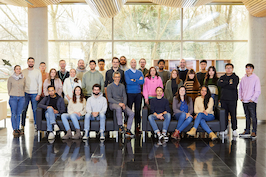Research Lines
We are mostly interested in the electronic properties of systems in reduced dimensions.
Our research program is articulated around different research themes: Spintronics, Multifunctional devices and Advanced nanofabrication.
Molecular Devices

We study the fundamental properties of organic molecules integrated into electronic devices.

We study the fundamental properties of organic molecules integrated into electronic devices.
Metal Spintronics

We create, transport and manipulate pure spin currents in metals and metal/insulator hybrids as an alternative to conventional electronics.

We create, transport and manipulate pure spin currents in metals and metal/insulator hybrids as an alternative to conventional electronics.
2D Spintronics

We use two-dimensional (2D) layered materials as building blocks for novel spintronic and (opto-)electronic devices.

We use two-dimensional (2D) layered materials as building blocks for novel spintronic and (opto-)electronic devices.
Nanofabrication

We use state-of-the-art techniques to build devices that allow us to explore the world at the nanometre scale.

We use state-of-the-art techniques to build devices that allow us to explore the world at the nanometre scale.
2D electronics

We use two-dimensional layered materials (such as graphene and transition metal dichalcogenides) as building blocks for novel (opto-) electronic devices.

We use two-dimensional layered materials (such as graphene and transition metal dichalcogenides) as building blocks for novel (opto-) electronic devices.
Nanodevices Equipment
The nanodevices group has access to nanoGUNE's common cleanroom equipment devoted to nanofabrication. In adittion, we have some equipment specially dedicated to our research lines.
Nanodispositivos news
Mariana Medina-Sánchez: “La convergencia de la microrrobótica, los nanobiosensores y la inteligencia artificial está transformando los tratamientos de reproducción asistida”
La investigadora Ikerbasque Mariana Medina-Sánchez, líder del grupo de Nanobiosistemas de CIC nanoGUNE, expone en un artículo publicado en Nature Nanotechnology su visión sobre los importantes avances que está experimentando la medicina reproductiva. Un ejemplo destacado de estos...Read more

